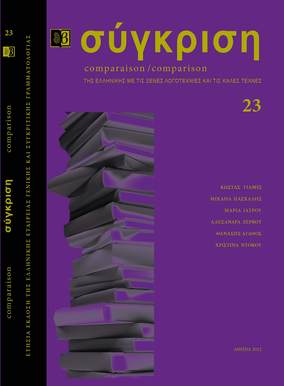Ο Κάλβος ως εκδότης, κριτικός και ποιητής : οι σημειώσεις στην «Ωδή εις Ιονίους» και η έκδοση των Χαρίτων του Φώσκολου
Part of : Σύγκριση ; No.23, 2013, pages 43-63
Issue:
Pages:
43-63
Parallel Title:
Kalvos as an editor, critic, and poet : The Notes to the “Ode to the Ionians” and the Edition of Foscolo’s The Graces
Section Title:
Articles
Author:
Abstract:
Andreas Kalvos’ career as an editor, critic and poet is bracketed by the notes to his “Ode to the Ionians” (1814) and the prologue to his own edition of fragments of Ugo Foscolo’s The Graces (1846). Both are written in Italian. Most of the notes to the “Ode to the Ionians” concern Greek,Roman and Italian poetry, and some involve issues of literary criticism. Considering the literary importance of The Graces and the fact that this fragmentary poem is the main intertext of Kalvos’Odes, his engagement with its edition and the commentary on readings of earlier editions reflect and convey his poetic sensitivity, of which it is the only example we possess after the publication of Lyrika in 1826. Notes 2 and 6 to the “Ode to the Ionians” contain fragments of The Graces,which will be included in Kalvos’ edition of 1846. In note 4, which is the longest one and contains four Italian and one Homeric passage, Kalvos criticizes harshly contemporary Italian translators of Homer, tacitly exploiting the knowledge he had acquired from Foscolo (the most accomplished translator of Homer) but without acknowledging his debt to him. In the prologue to his edition of The Graces he criticized earlier editors, on the grounds that they distorted in various places the original text by introducing readings that do not accord with what he had heard from Foscolo himself and what he knew from the manuscripts he possessed. Twenty years after the publication of Lyrika (1826) and the death of Foscolo (1827) the poetry of his fellow-Zakynthian and mentor was still on his mind, and especially The Graces, the poem which provided the main inspiration for the composition of the Odes.
Subject:
Subject (LC):
Electronic Resources:
References (16):
- Μιχαήλ Πασχάλης, «Ο Ελύτης, ο Κάλβος και ο Πίνδαρος», υπό δημοσίευση στα Πρακτικά του Επιστημονικού Συμποσίου «Επιρροές του Ελύτη», Ηράκλειο, 11-13 Νοεμβρίου 2011
- Μιχαήλ Πασχάλης, «Τι γυρεύουν οι μέλισσες του Κάλβου “εἰς τὸν πολὺν καρπὸν λυαῖον”;», Πόρφυρας, τχ. 144 (Ιούλιος – Σεπτέμ- βρης 2012)
- Μιχαήλ Πασχάλης, «Οι ιταλισμοί των Ωδών του Ανδρέα Κάλβου», Νέα Εστία, τχ. 1809 (Μάρτιος 2008)
- Michael Paschalis,«La costruzione di Zante in Foscolo e Kalvos», Σύγκρισις / Comparaison, τχ. 14 (Οκτώβριος 2003)
- Filippo Maria Pontani, «L’Ode a Zante di Kalvos», Ελληνικά, τ. 19, τχ. 2ο (1966)
- Filippo Maria Pontani, «Questioni Kalviane», Atti dell’Istituto Veneto di scienze, lettere ed arti, 124 (1955-1966)
- G. Spadaro, «Imitazione e originalità nelle similitudini dell’Erotókritos, Letteratura cretese e Rinascimento italiano, Soveria Mannelli 1994
- Γ. Δάλλας, «Παρεκβολές στις “Ωδές” του Κάλβου», Δωδώνη (Ε.Ε.Φ.Σ.Π.Ι., Τμήμα Φιλολογίας), 19 (1990)
- Franco Gavazzeni, Ugo Foscolo, Opere,I, Poesie e tragedie, Τορίνο 1994
- Vincenzo di Benedetto, Lo scrittoio di Ugo Foscolo,Τορίνο 1990
- U. Foscolo,Poesie e carmi, a cura di F. Pagliai, G. Folena e M. Scotti, Φλωρεντία 1985 (Edizione Nazionale delle Opere, τόμ. I: στο εξής ΕΝ, Ι)
- Γ. Ζώρας, Ωδή εις Ιονίους και άλλα μελετήματα, Αθήνα 1960
- Camillo Antona-Traversi, Frammenti sconosciuti dell’Inno alle Grazie, στο Curiosità foscoliane,Bologna 1889
- Camillo Antona-Traversi, Una lettera inedita di Ugo Foscolo e una canzone inedita di Andrea Calbo, Ρεκανάτι 1884∙ πιο προσιτή είναι η δεύτερη ανατύπωση στο: Camillo Antona Traversi, Studi su Ugo Foscolo, Μιλάνο 1884
- Μιχαήλ Πασχάλης, «Γύρω από τις πηγές έμπνευσης του Κάλβου», Νέα Εστία, τχ.1852 (Φεβρουάριος – Μάρτιος 2012)
- Μιχαήλ Πασχάλης, «Ο Κάλβος ομηριστής;», Τριαντάφυλλα και Γιασεμιά. Τιμητικός τόμος για την Ελένη Πολίτου-Μαρμαρινού, επιμέλεια Ζ.Ι. Σιαϕλέκης και Ερασμία-Λουίζα Σταυροπούλου, Αθήνα, εκδόσεις Gutenberg, 2012




